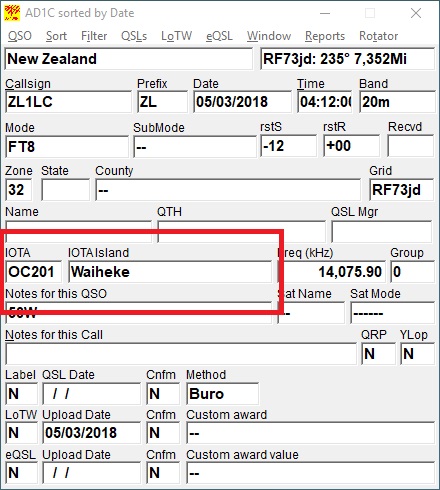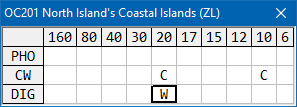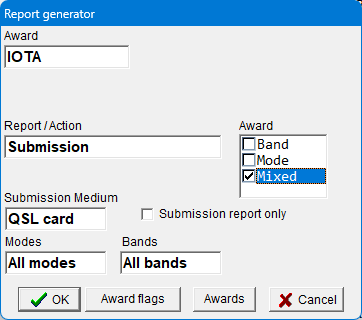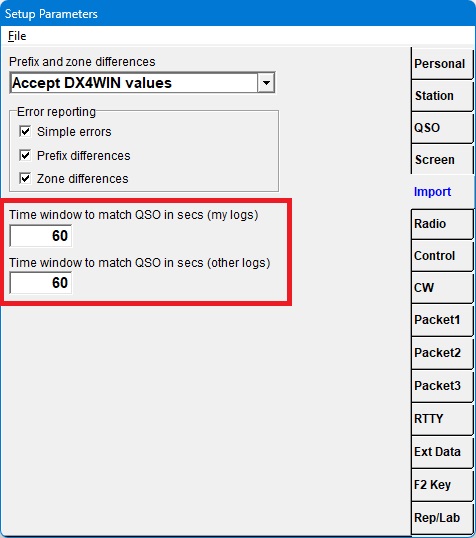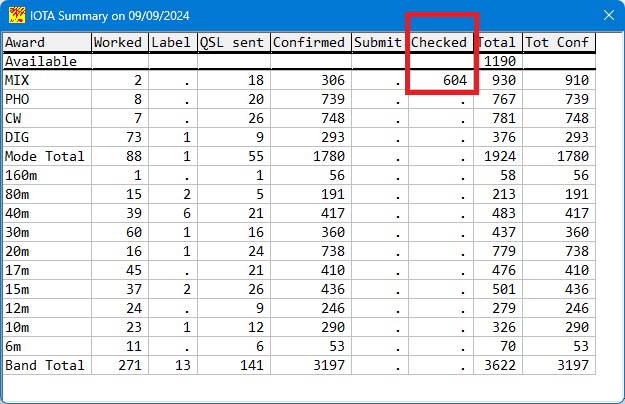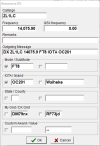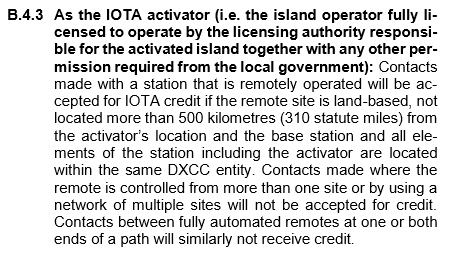Updated: 18 September 2024
This application note is intended to help DX4WIN users who are chasing islands for the Islands on the Air (IOTA) award.
Table of Contents
What is IOTA
Determining IOTA from Country, Prefix or Callsign
Some Important Information about the Award
Submitting IOTA Credits
Approving IOTA Credits
Check IOTAs
IOTA and DX Cluster
Remote Island Operation
What is IOTA?
To summarize from the IOTA Website:
The IOTA (Islands On The Air) Programme promotes radio contacts with stations located on islands around the world. It is administered by Islands On The Air (IOTA) Ltd (called here IOTA Management) in partnership with the Radio Society of Great Britain (RSGB).
IOTA Management has grouped the oceans' islands into some 1200 'IOTA groups' with, for reasons of geography, varying numbers of 'counters', i.e. qualifying islands. The objective, for the IOTA Island Chaser, is to make radio contact with at least one counter in as many of these groups as possible.
DX4WIN has had the ability to track counters for the IOTA award since its early days. Each QSO in your logbook can be assigned an IOTA group reference, as well as an island name:
An IOTA reference number consists of a 2-letter continent abbreviation, followed by a 3-digit group number.
IOTA award tracking is similar to other awards. There is a window to show the band and mode status of the current IOTA:
You can get a status summary from the Reports menu, as well as as a listing of IOTA worked. IOTA credits can be submitted and checked (approved) using award flags.
Determining IOTA from Country, Prefix or Callsign
DX4WIN has several methods of automatically determing the IOTA reference from the callsign:
- Some DXCC entities consist of a single IOTA group, like Barbados, 8P.
Logging a QSO with any such station will automatically populate the IOTA
field in the QSO window with the IOTA group reference number NA021.
- Pre-fill from previous QSO (see below)
- Importing confirmations from
ARRL Logbook of the World
(LoTW) can populate the IOTA field if the station you worked includes an
IOTA in the Station Record used to sign the QSO that was uploaded to LoTW.
- Importing an IOTA Contest log.
Users of DX4WIN 9.01 and later will have the following additional features:
- Sometimes a prefix specifies a particular IOTA. For example,
logging IH9P will result in DX4WIN populating the IOTA field with the IOTA
group reference number AF018.
- Some callsigns will automatically populate the IOTA field. This can be a resident like JS6TKY on Yonaguni Island in the Yaeyama Islands group, AS024. It can also be a DXpedition, like C96RRC in April/May 2018 which counts for the Nampula District Group, AF088.
You may also notice that the IOTA Island field is sometimes populated, when there is only a single island in the group. Other times, the user must select the IOTA Island from a drop-down list. This is best done when marking the QSO as Confirmed from a received QSL.
Importing a log from another program will populate the IOTA field based on the same criteria above.
Callsign to IOTA mappings are added to the country database as they are announced. However, due to the country file release "schedule", it's possible that the DXpedition could have come and gone before the country file with particular IOTA mapping was released. Also note that the IOTA field(s) in your logbook will not change when the DX4WIN country file changes. You will need to manage this field in your logbook yourself. See the section on "Check IOTAs" below.
Some Important Information about the IOTA Award
All QSOs submitted for IOTA credit must specify both the IOTA reference number and Island Name. The QSL card must have both the IOTA group number and the Island Name printed on it, though QSLs for QSOs before <year> may be grandfathered in.
Submitting IOTA Credits
IOTA credits work in a similar manner to DXCC credits. Submitting confirmed QSOs for IOTA credit results in DX4WIN marking these QSOs as Submitted. When the credits have been approved, the Submitted status can be changed to Checked through the Reports menu.
Using the IOTA website, there are three ways to submit QSOs for IOTA credit:
- Add QSOs from Club Log
- Add QSOs from LoTW
- Add QSOs manually (requires sending QSL cards to your local IOTA checkpoint)
This note will not go into the submission details here. But they are all available from the "My IOTA" menu on the IOTA website.
Using the Report generator, DX4WIN can help you determine which of your QSLs you need to submit. In the QSO Window, click on Reports. Select IOTA as the award and Submission as the Report/Action. Most people will be submitting credits for the general (Mixed) IOTA Award, so make sure that both the "Band" and "Mode" fields are unchecked as shown below.
Click on the OK button to create the submission report. You will probably want to right-click on the report and "Write to File". This will give you a list of the QSL cards you need to locate so you can submit them for IOTA credit. You may want to work from a printed copy of the report to help you. Depending on how your QSLs are filed, it may be easier to work from a listing that is sorted by Callsign instead of by IOTA reference number. You can do this by opening the listing using a program like Microsoft Excel. Your submission should include the listing that is sorted by IOTA reference.
Your IOTA Submission will require both the IOTA reference number as well as the Island name for each QSO. Using the IOTA Submission report generated by DX4WIN (not the copy you saved), you can double-click on any line that does not specify an Island name to go to that QSO in your logbook. Select the IOTA Island as shown on the QSL card, then save the QSO using F10. The IOTA Submission report will not show the change right away. When you are done entering Island names, close the IOTA Submission report and generate it again, and then you should see them.
Approving IOTA Credits
After the IOTA QSOs you submitted for credit have been Checked/Approved, you can download a list of all your credits from the IOTA World website and use this list to automatically mark those IOTA QSOs in your log as Checked. One advantage of this method is the if you have IOTA QSOs confirmed on Club Log that were submitted for credit, those QSOs in your DX4WIN logbook could still be unconfirmed via QSL or LoTW. They would never be used when trying to submit DX4WIN QSOs for IOTA credit. But DX4WIN can set a QSO to Checked, even if the QSO is not confirmed.
Here is how to mark your IOTA QSOs as Checked/Approved in DX4WIN:
- Log into your account on the
IOTA website.
- Once in your account, look under the "My IOTA" menu for "Download
QSOs"
- On the IOTA website, click on the link shown in this line and save
the listing (do not click on the link below):
Download your QSOs in CSV format here.
- In DX4WIN, click on QSLs | Use IOTA file for awards
- Navigate to the location of the CSV file you downloaded from the IOTA website, select it, then click on the Open button.
- You should see a confirmation window like the following:
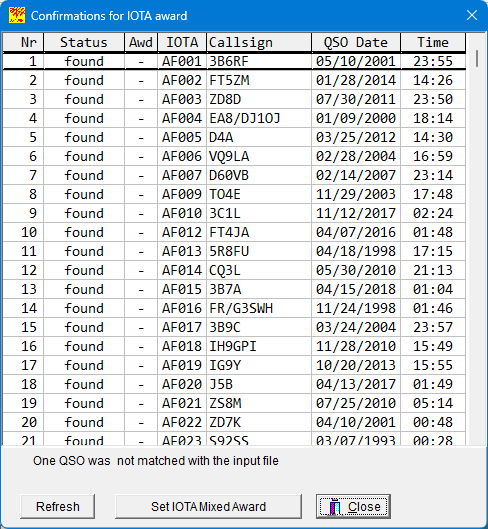
- Take note of any QSOs marked as "not found". You will
have to decide how to resolve each one.
- When you are satisfied with the results, click on the "Set IOTA Mixed Award" button at the bottom of the window to update your logbook, then save your log. Click on the Close button in the Report window to close it.
IMPORTANT: The IOTA website may not record the same time of each QSO as is shown in your logbook (down to the second). For QSOs that you entered (submitted) manually, there is no way to specify seconds at all!
When DX4WIN is trying to match QSOs from the IOTA credit report, it will try to match the time exactly. This can result in mismatches when using the "Use IOTA file for awards" function if the time in the IOTA report does not exactly match the time in your DX4WIN logbook. You can fix this by setting a time window on the Import tab of your DX4WIN preferences, as shown below. A value of 60 (seconds) should be adequate. This needs to be done before "Use IOTA file for awards".
At this point, you can generate an IOTA Summary Report that should show all the IOTA that have been Checked/Approved.
Check IOTAs
DX4WIN 9.01 added a new Multiple QSOs operation called Check IOTAs. This does the following four things:
- Populate empty IOTA fields based on the country and callsign.
- Populate empty IOTA Island fields if the IOTA Island is unique for the given IOTA group.
- Report logged IOTAs that may be incorrect, based on the country or callsign.
- Report logged IOTA Island fields that may be incorrect for the given IOTA group.
Regarding #3 above, DX4WIN contains a Country to IOTA mapping database. That database also maps US States to IOTA. An IOTA is considered to be incorrect if it is not found in that database for the given country or state (USA). Note that the mapping database was partially built by hand, so there could be some false errors. Please report any you find!
As you can probably guess, #1 will help you get started with IOTA by populating the IOTA field based on the current country database.
Here is a way to use this function to help you check your log for incorrect IOTA:
- Save your original log in a safe place! You may want to restore it after checking for IOTA errors.
- Type F8, put '*' (asterisk or star, without the quotes) in the IOTA field, then Enter
- QSO | Multiple QSO Operations | Check IOTA
- Type F8, put IOTAMSG in the "Notes for this QSO" field, then Enter. This will filter to only the QSOs with IOTA mismatches.
At this point there are two kinds of IOTA messages you may see:
- Bad IOTA - this means that the IOTA is not valid for the DXCC entity
indicated by the callsign (Prefix field).
For USA stations, it may mean the IOTA is not valid for the State shown for that QSO. - Unique Island - this is the IOTA that the DX4WIN country database believes to be correct for that QSO.
Bad IOTA messages may also indicate a problem in the DX4WIN country database. Some islands have changed DXCC entity over the course of time, and it's possible that the old DXCC entity does not think the IOTA is valid. Once example is Ducie Island, which used to be part of the Pitcairn Island DXCC entity until it was split off into a separate DXCC entity.
IOTA and DX Cluster
When spotting an island QSO from your log to the DX Cluster, it is useful to other stations to include the IOTA group number in the spot comment. In DX4WIN 8.05 and earlier, you have to enter this by hand, but DX4WIN 9.01 and later make it easier by grabbing the IOTA from your log and including it in the DX spot simply by checking a box (click image to enlarge):
There is no way to "grab" the IOTA from a DX spot, nor is there a way to have color highlighting of needed IOTA in the DX spots window, like there is for DXCC.
Remote Island Operation
An island station (IOTA activator) must satisfy the requirements in section B.4.3 of of the IOTA Programme Entry Rules in order to count for credit:
It is not always possible for an IOTA chaser to know whether the station s/he is working meets the requirement above. This problem will become more pervasive as more DXpeditions employ Rig in a Box technology, where the transceiver and antennas are land-based, but the operators are remote, either from an off-shore vessel or in a different DXCC entity. The use of Rig in a Box by the IOTA activator does not necessarily preclude also having simultaneous land-based operations from the same island (group). An activator may chose to use a single callsign for the activation, which makes the IOTA status ambiguous to the chaser. This problem can be ameliorated by using one callsign for land-based operation and a different callsign for remote operation, as was done with the February 2024 DXpedition to Robinson Crusoe Island (IOTA SA-005). The group used CB0ZA for land-based operations and CB0ZEW for remote operations. QSOs with CB0ZA count for IOTA credit, but QSOs with CB0ZEW do not.
By default, DX4WIN will populate the IOTA field in the QSO if it can be determined definitively. Or the user may chose to fill in that field himself. However, that does not guarantee that the QSO can be used for IOTA credit. You may not know the status until you receive a confirmation for that QSO. If the confirmation is from LoTW, then you should check the LoTW confirmation record on the LoTW website to determine whether the IOTA field was populated or not.
If a QSO should not be used for IOTA credit, the user has several options. #2 is preferred, however, because the Multiple QSO Operation "Check IOTAs" will fill in the IOTA reference number you removed in #1 below.
- Remove the reference number from the IOTA field in the QSO
window and save the QSO.
- Change the IOTA award status to Invalid. To do this, use the F5
key to expand the QSO window until the award flags are visible.
In the IOTA column at the bottom, set the Mixed, Band and Mode flags to 'I' to
indicate that the QSOs is not valid for IOTA. See the following
example:
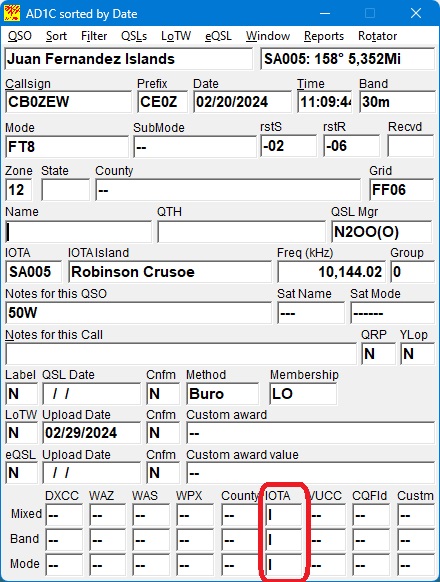
After making the change shown above, use F10 to save the QSO. You can then use the F5 key again to restore your original QSO window configuration.
